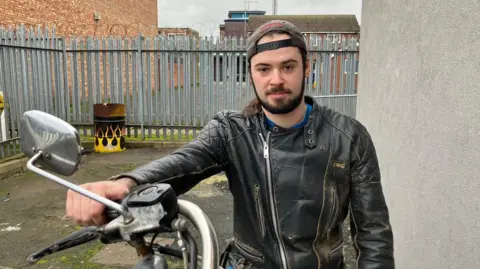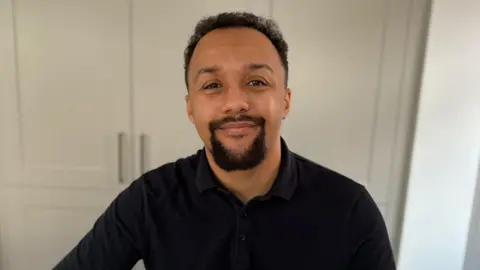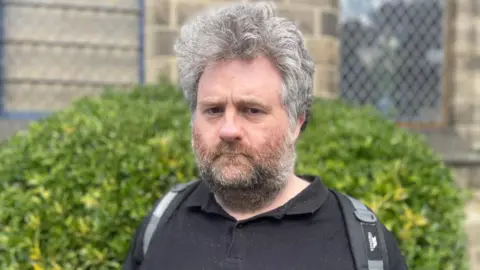Vicky Johnson, Lucy Parry, Alice Evans and Gerry GeorgievaBBC Yorkshire & Lincolnshire Investigations
 Mike Barley
Mike BarleyWhen Mike Barley almost died in a motorbike crash on the way home from work, he did not think his biggest worry during recovery would be the council tax bill he had been sent that same day. But after he missed a payment reminder letter while in hospital, his debts rocketed out of control.
Mr Barley, 26, from Grimsby, North East Lincolnshire, had a “well-paid” job as a software developer, and owned his own home, but the accident in March 2021 put him in hospital for a month with broken ribs, a collapsed lung, and severe injuries to his arms and legs.
The same day as the accident, Mr Barley was sent a council tax bill for an instalment of £101.71. He missed the payment and was still in hospital when a reminder letter was sent to his home, so he missed that, too.
Mr Barley said he was “stuck” on sick pay of £90 a week at the time and remembered thinking: “I’ve got no income any more – I can’t work, I can’t walk. Where is this money going to come from?”
He says after telling his local council he would not be able to pay, they sent another letter, in June 2021, setting out a payment plan. It included two months of reduced payments but then demanded Mr Barley pay the rest of the year’s payments in advance – a total of about £1,000.
Mr Barley’s council acted in line with the usual process for unpaid council tax in England.
If you do not pay your monthly bill after three weeks, or you have three late payments, councils can demand the remainder of the year’s bill in full, and can send in bailiffs to collect the debt.
Charities have long claimed the method of council tax debt enforcement in England punishes people who are genuinely struggling to pay – while the government says it is taking action against “archaic and aggressive” practices.
 BBC News
BBC NewsAfter further reminder letters and warnings, Mr Barley’s case was passed to bailiffs, who sent a “threatening letter” telling him they would be coming over to seize and sell his belongings to help pay off his debt.
“It was scary to be honest,” he said.
Council tax funds public services such as care for the elderly, libraries and bin collections.
It must be paid by anyone who owns a home, or lives in rented accommodation, unless they are eligible for exemptions.
When councils bring in bailiffs to try to recover council tax debt, the person who owes money is charged an additional £75 for the initial bailiffs’ letter, £235 plus costs if a bailiff comes to their home to remove or sell goods, a £110 sale fee if goods are taken for sale, and 7.5% of the debt value over £1,500.
Mr Barley said he tried to dispute the charges he faced because of the late bill, but received no support and bailiffs continued to deliver letters to his home.
“It just makes you trapped, depressed,” he said.
Mr Barley said his relationship broke down under the strain of trying to cope with his escalating council tax debt, which he estimates reached a total of about £6,000.
He fell behind on his mortgage and other payments too. He managed to get a credit card cleared, but his home was eventually repossessed, and he said he had such little money to spend on food that his meals consisted of bread smeared with ketchup.
He said his council tax debt was “probably the worst” to deal with because of the speed with which the total amount increased.
Mr Barley still owes about £1,700 of the £6,000, including £700 of bailiffs’ fees.
He wants councils to stop bringing in bailiffs when the person in debt cannot pay.
“It just adds charges,” he said. “If [people] can’t pay it in the first place, giving it to a bailiff is then going to make it harder.”
Councils in East Yorkshire and Lincolnshire referred about 38% more people to bailiffs in the most recent year of data than the previous 12 months, our research found.
North East Lincolnshire Council said it could not comment on individual cases but had set aside a £100,000 hardship fund to support some of those unable to pay off their council tax debt.
The council said on a case-by-case basis it sometimes gives people extra time to pay back their council tax, or helps them find ways to reduce their bill. Councils can decide to write off some debt too.
Matt Sheeran, of free-to-use debt advice service Money Wellness, said people should seek help straight away if they did have problems paying their council tax.
“It’s just so fast and so aggressive, so a lot of people are taken aback,” he said. “They just don’t realise how quickly [it] can escalate.”
 Money Wellness
Money WellnessPeter Tutton, policy director at the StepChange charity, which also offers free debt advice, added the pressure some councils put on people when they chased payments could make people’s financial difficulties “worse”.
“People respond to payment demands by missing other bills, turning their heating down, borrowing,” Mr Tutton said.
Figures published in June showed local authorities in England are owed £6.6bn in council tax in total, up 50% from £4.4bn five years ago – despite councils writing off more council tax debt than they used to. In the most recent year of data, £250m such debt was written off, in comparison to £134m five years ago.
Further data obtained by the BBC through Freedom of Information requests revealed:
- Councils are increasingly referring people to bailiffs to help retrieve outstanding debt.
- Across the 253 councils that provided us with information, 1.4 million accounts were referred to bailiffs in the past year – 46% more than four years ago.
- But the average amount they have been able to retrieve per account has gone down slightly, suggesting bailiff action may not be as effective as it used to be.
In Bradford, West Yorkshire, the council referred 41% more people to bailiffs in the most recent year of data than the previous 12 months, our research found.
The council put up council tax rates by almost 10% this year, as it tries to deal with rising debts which will see it owe more than £1bn by 2030.
Those affected include Edmund Davies, who owes about £1,800 in council tax and is struggling to make ends meet with the £295 he receives in benefits each month.
He said the council tax increase has made things much more difficult for people in his position.
“I’d like to pay it – it’s just trying to come to an actual affordable agreement with the council that’s difficult,” said Mr Davies, who also pays £20 a month towards council text debt he owed from his previous address.
“To pay any more… do I eat today, do I eat this week?” he said.
 BBC News
BBC NewsMr Davies recently received groceries from the Bradford North Foodbank, where demand has risen by 30% over the past year.
Foodbank manager Franco Biancardo said some of this increase was down to council tax debt. He is calling for the council to collect the debt “in a softer way” instead of going through the courts process.
Bradford Council said it was committed to helping those struggling to pay council tax and has given an extra £1.2m in support this year.
A spokesperson added that the rise in enforcement visits in the past year was due to reasons including new charges for homes left empty over a year, and clearing a backlog of cases.
Central government is currently reviewing council tax debt-enforcement practices.
A spokesperson for the Ministry of Housing, Communities and Local Government said it was “taking robust action to tackle the archaic and aggressive collection practices that have seen vulnerable people who miss payments subjected to unmanageable lump sum payments and liability orders”.
A spokesperson for the Local Government Association said councils had “a duty to residents to collect taxes” and that bailiffs and other enforcement were “a last resort”.

